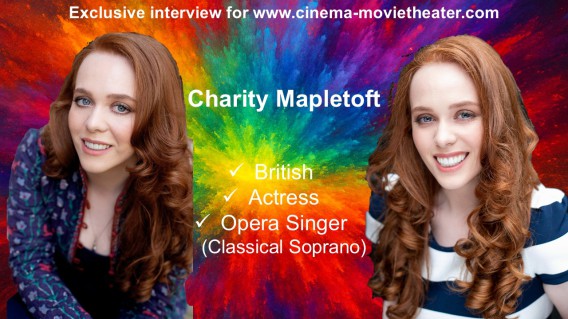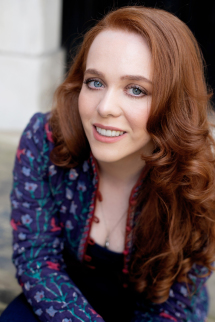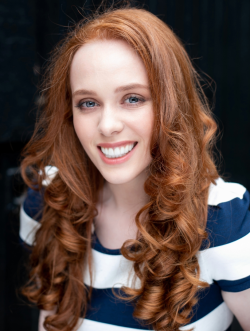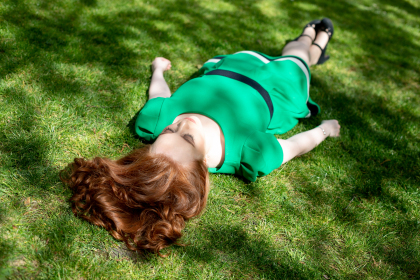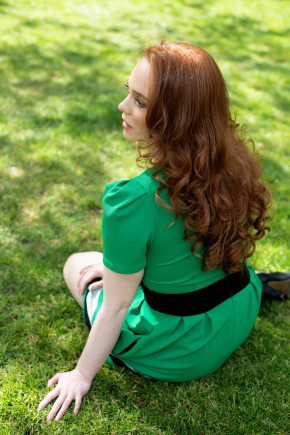
Exclusive interview with Charity Mapletoft, British Soprano and Actress
By Jean-Paul Eliard
The 04 September 2025
Hi, Charity, I'm very happy to do this interview!
How do you do? It is an honour to speak with you and your audience.
Can you introduce yourself to the visitors of cinema-movietheater.com?
Of course. My name is Charity Mapletoft, and I am delighted to share my work as both an actress and opera singer (classical soprano) with you.
Onscreen, I have appeared in productions such as Star Wars: Episode VIII – The Last Jedi, The Riot Club, and Muppets Most Wanted.
As an operatic soloist, I am thankful to have received international awards, performing on such stages as Carnegie Hall, Queen Elizabeth Hall, the Mozarteum Großer Saal, Hyogo Performing Arts Center, Glasgow Royal Concert Hall, and Usher Hall.
What was the first ‘big’ script you read and why, and what did you first find interesting in it?
It was Annie, the musical. I was ten years old and played Pepper, while understudying Annie, at the Grand Opera House, York. I had fallen in love with the story long before the audition came up, so I was overjoyed when given the opportunity to perform the role.
As for what ‘interested’ me, the very first thing was actually the script itself – before anything in it.
When it arrived in the post, I remember my heart hammering with excitement.
I opened the parcel and ran my fingers all over the pages, taking in the musty, papery smell, the Courier typeface, that classic, Annie logo with the cartoon redhead on the cover…
To me, a script was a living, breathing thing, and holding my first felt metaphysical. My imagination was on fire before I’d even glanced at the title page.
How do you prepare for your roles as Actress or Soprano?
I take what I call a Macro-Micro approach.
The Macro includes everything in my life that is not directly related to a specific role, but has a fundamental impact on the outcome of any given performance: areas such as prayer life and spiritual development; vocal technique; stagecraft and screenwork; linguistic study; physical training; diet; what I listen to, watch, and read; who I surround myself with; etc.
I choose not to engage in anything that does not have a positive – or, at least,
a neutral – influence on my artistic work. That way, I can continuously grow as an artiste, regardless of the particular activity.
The Micro is role-specific, and varies depending on whether it involves operatic/classical singing or spoken acting; whether it’s onscreen or theatrical; whether I am working with an accent, or in a different language...
However, my aim with any role is to be in a constant, egoless state of exploration, and there are three fundamental elements that allow me to do this.
One is a character’s justification: what are the reasons behind my thoughts, words, and actions? It is crucial to realise and embrace these if I am to be believable in a given set of imaginary circumstances.
Another is familiarising myself with, and really tuning into, the sensory details of a character and scene.
That allows for a lot of imagination when preparing without a set.
The third is making sure I have everything absolutely committed to memory, to enable creative freedom and spontaneity in the moment.
As I’m learning a role, I’ll have the lines and/or music running in my head throughout the day, and copies of scripts/scores and notes with me at all times.
Why and when did you choose to be Soprano and Actress?
For me, being a performing artiste has never been so much a choice, as a vocation.
Speaking as a Roman Catholic Christian, I believe very deeply that we are all called to serve.
No matter what our individual direction may be, we should approach all things with true humility and never for the satisfaction of our own ego.
Having an artistic career is not only an indescribable joy, but also one of the most personal ways in which I can serve others, and I am so wonderfully grateful for that.
The ‘when’ has been for as long as I can remember, and still is.
At the age of four, I was telling everyone I met that I wanted to act, even going to the Yellow Pages to see if there were any stage schools near me, although financial barriers didn’t allow for that particular option.
It was also at that age that I first got up onstage and sang, and asked to learn music.
Before I was able to take lessons formally, I began to teach myself, checking out library books on acting, singing, and music history; playing back melodies by ear on the local church organ; and learning how to read musical notation with an introduction-to-piano book.
Through scholarships and sponsorships, I began voice and instrumental lessons after a couple of years, and started to be cast in theatrical productions.
By the time I was twelve, my voice had become very mature.
I was competing internationally in classical music competitions, and that led to solo TV and radio work.
As opera is a combination of both classical singing and acting, I knew that that was something I wanted to pursue, even before seeing an operatic production.
In order to have a career as an actress as well as a musician, especially as a screen actress, I understood the need to train in that just as intensely, and began to do film work regularly during the course of my undergraduate study. Then, throughout my postgrad. at the Royal Conservatoire of Scotland, I studied alongside the acting students in addition to my operatic degree, and have continued to train privately ever since: learning is lifelong.
You have acted in feature films including Muppets Most Wanted (2014), The Riot Club (2014), and Star Wars: Episode VIII – The Last Jedi (2017). What memories do you have of these shoots?
The first thing I remember in each case is how phenomenal the crews were. Every crew member I interacted with cared so deeply about their work, and about the actors on set – just superb human beings.
For each film, I never failed to be awestruck by the sheer scale of the productions; that happened each time I went into work.
Both Muppets Most Wanted and Star Wars were filmed at Pinewood Studios, and the sets for those were so vast.
I couldn’t believe what the teams had managed to create. Even the Muppets themselves were a lot bigger in person than I presumed they’d be (and hats off to the immensely skilled puppeteer-actors controlling them).
In both The Riot Club and The Muppets, we were shooting scenes that required clothing opposite to the weather we were experiencing, so that was challenging. The Muppets required summer dress when shooting in freezing February temperatures, and The Riot Club warranted woolly winter outfits – right in the middle of summer.
That took a moment to get used to, but it proved another great learning experience.
For Star Wars, the wig was such that I both felt like a queen, and as if I were carrying a small dog on my head (great for posture).
I loved it. I did a double-take when I saw someone in a stormtrooper costume grabbing a croissant, thinking, ‘now, that’s surreal’.
But, most of all, I remember feeling what an immense privilege it was to be a part of something so iconic.
You have also taken lead roles in Back for the Future (2022), Track and Trace (2022), and The Female Gaze (2022) (source: Charity Mapletoft's biography on charitymapletoft.com). What memories do you have of those?
The short films presented different challenges to the feature films, as they all involved really fast turnarounds. In each case, there were a lot of last-minute script changes and rewrites, so having the ability to memorise quickly while staying grounded was essential.
One of the advantages of having to work under time-limited conditions is the opportunity to become hyper-focussed very rapidly.
I had a similar experience when performing at Carnegie Hall last season: the allotted stage rehearsal time was four minutes on the day to run edited programme highlights, and that was it.
In such circumstances, there’s no room for any distractions and, rather than being daunting, a lack of time can be a wonderful tool to channel adrenaline.
You
are both Actress and Soprano. What do you like about this?
Acting and singing, particularly classical/operatic singing, are inextricably linked. They are both media that rely, for the majority of roles, on the human voice as the primary communicator. In my
work, each genre feeds into and enriches the other. That is beautiful, but there are important differences that give each its uniqueness.
Spontaneity in the two art forms is manifested differently, for one thing.
In spoken acting, the artiste has a lot of freedom with the pace of the words and the precise way in which they speak.
This allows for a lot of in-the-moment variety and sometimes improvisation.
In opera, so much expression comes from the music itself, and aspects such as tempi, dynamics, articulation, etc., are more fixed, often led by a conductor. There, spontaneity comes through the sensory nature and flow of the music, as well as elements such as comic timing, ornamentation, and cadenzas, which may be somewhat improvised depending upon the production.
The concept of Realism doesn’t exist the same way in opera as it does in spoken acting, due to the very nature of a story being told through song. The body has to be used differently, too, due to the technical demands of opera, which is often referred to as the Olympics of singing for this reason.
All of this adds up to a fantastic theatrical spectacle, often taking audiences to ethereal heights of emotion that they cannot express purely through words.
Screen acting, by contrast, is so intimate and personal: the most subtle facial expressions can communicate an eternity, and speak to a person’s very core in a way that’s impossible in the theatre.
The camera lens picks up every single thought: it never lies, and that is electrifying.
What is your next challenge/project?
I have a number of international operatic concerts, recordings, and semi-final/final competition rounds coming up in the immediate future, as well as some extremely exciting acting work – the specifics of which will be revealed in due course…
Do you have anything to add?
Yes: a simple reminder for those reading to walk in faith with hope and love – always – and never be afraid to share that light with others.
In so doing, focus on the work; drown out the noise; and enjoy exploring!
That’s what you can control.
As for the outcome: feel the freedom and excitement of surrendering that to God.
Thank you very much for your interview, Charity, and I wish you all the best!
More information about Charity on charitymapletoft.com, on Instagram, on Youtube and on IMDb
